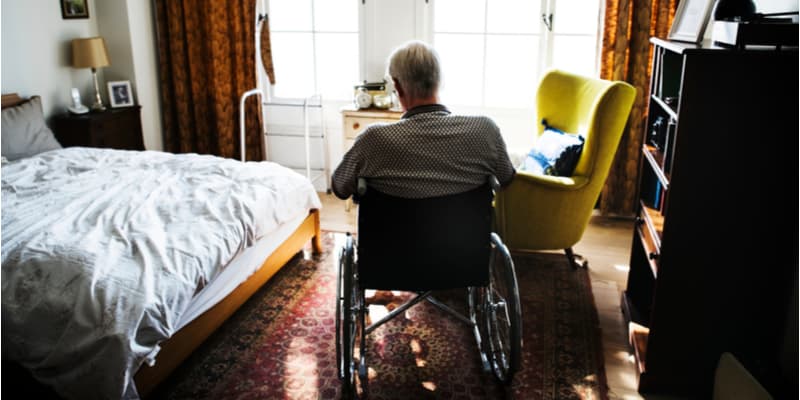The number of Australians aged over 65 is projected to become 25 per cent of the population within the next two decades.
To meet the increase in demand for services to support longer life, the Australian Government allocated $7 billion to services for aged care in the 2019-20 Budget. This investment will contribute toward improving mental health in older Australians, both directly and indirectly.
It will also create career opportunities for 366,000 aged care workers to support our health and mental health across our lifespan.
Mental health has become a growing concern for Australians, and there are many risk factors for mental illness in older people. Here’s how improved mental health support services can better support the increasing needs of older Australians.
Loneliness
At this moment in time we know that 40 per cent of older people in aged care receive no visitors. This statistic was brought to life in vivid colour recently on ABCTV in the experimental series Old People’s Home for 4 Year Olds. A team of experts in geriatric health and wellbeing and an early childhood expert took a group of pre-schoolers to spend time with older people in their nursing home to observe the impact on their health and mental health.
This fascinating and heartfelt social experiment tugged at the nation’s heartstrings, and demonstrated a model of care that could potentially transform the way we support vulnerable older people.
Loneliness was discussed almost immediately as one of the greatest challenges for the aged care residents. The program also revealed that some people in aged care spend up to 20 hours of every day in their room. Shirley was one of the residents who was diagnosed with depression. She summed up the experience of many older residents when she spoke about how loneliness had impacted her.
“I have felt very lonely at times. When I first came here, I missed my friends, and as my health didn’t allow me to get out the door, I didn’t meet many people and that hurt me,” Shirley explained.
Social isolation is a common cause of mental illness and can occur even when other people are around. The Australian Government is investing $282.4 million to create more home care packages to enable older Australians to continue living in their homes. In addition to providing subsidised access to essential services, home care packages allow people to participate in social activities in their community. Participation in these groups can reduce feelings of isolation and also increase knowledge and promote coping efforts.

Physical health problems
Old People’s Home for 4 Year Olds also demonstrated how physical health problems can have a dramatic impact on mental health. One of the older residents, Brian, was also diagnosed with depression, which he attributed to his failing eyesight. Before entering a nursing home, he had been a keen gardener who was particularly enamoured with colourful flowers. Losing his vision, along with other physical health problems, had completely demotivated him.
“I’m not interested in having a purpose. I mean, everybody thinks that they should do everything they can to keep us alive. We’re here to die and the sooner the better,” was Brian’s blunt assessment.
An increase in physical health problems such as heart disease, stroke and Alzheimer's disease is a recognised risk factor for anxiety or depression. Chronic pain and admission to hospital are also common experiences for older Australians that can lead to mental illness.
While GPs are the main source of healthcare for older people, they are also usually the only source of healthcare that they actually seek. But with the complexity of multiple physical health problems and the way older people interact with mental illness, GPs face challenges in delivering effective treatment. This highlights the need for more services to manage mental health across the lifespan.
That’s where the Australian Government’s Aged Care Workforce Strategy to create 336,000 roles for aged care workers comes in. Right now is a good time to be considering postgraduate education in mental health, such as SCU Online’s Master of Mental Health, to develop the skills to effectively respond to growing patient needs.
Losses
Grieving the loss of a loved one can have an impact on mental illness that is exacerbated by the accompanying loneliness. But as we age, we lose many things that define us and contribute to our human experience. Mental health support service Beyond Blue points out that the loss of relationships, independence, work and income, self-worth, mobility and flexibility can all be contributing factors to mental illness.
Shirley describes losing her memory after an operation, which lead to her isolation, loneliness and depression. Brian is reluctant to participate in any activities because of his loss of vision. And Eric explains that his family’s best intentions took away many of his favourite things in life when they moved his life into a single room in residential care.
“Prior to that I had the house, I had a garden, I had my animals to keep me company. The general family opinion was that it was getting beyond me and safer for me to come to a place where I was watched and couldn’t hurt myself too much,” Eric laments.
To help older people maintain the things in life that they value, such as relationships, independence, self-worth and mobility, the Government is putting the bulk of its $7 billion aged care budget into the Commonwealth Home Support Programme. This provides specialised support for conditions such as low vision and dementia. It also helps with home maintenance to keep the home and garden safe.

Mental health support services need more qualified workers
If Australians are to age successfully, they need to be engaging with life, avoiding illness and disability and maintaining high cognitive and physical function. These three factors will help prevent the risks of loneliness, physical health problems and losses leading to mental illness. With a quarter of the population soon to be over 65 years of age, there’s a rapidly growing need to expand and improve mental health support services for older Australians.
SCU’s Master of Mental Health will enable you to be at the forefront of the expansion and improvement of mental health support services in Australia. You’ll develop immediately implementable skills from clinically experienced mental health academics for a rewarding future.
Learn more about our online Master of Mental Health and Master of Mental Health Nursing. Get in touch with our Enrolment team on 1300 863 819.







